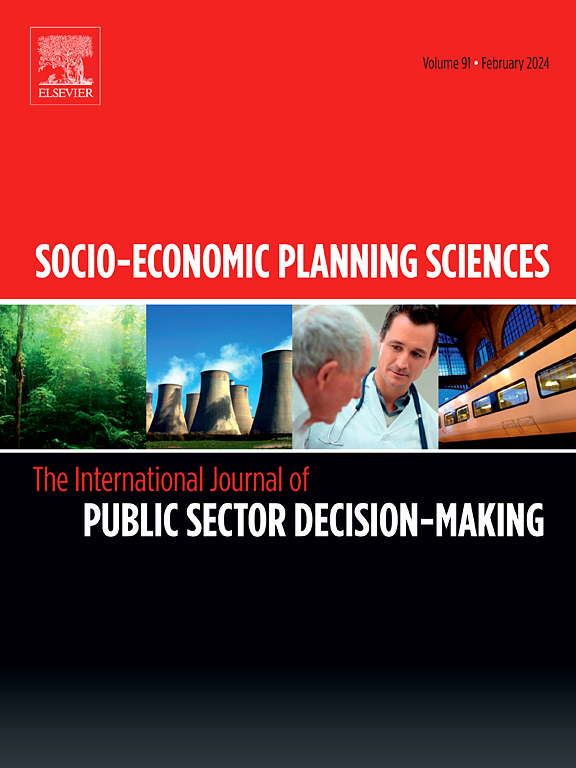Assessing regional economic Performance: Fuzzy multi-criteria decision making and panel regression approach
IF 5.4
2区 经济学
Q1 ECONOMICS
引用次数: 0
Abstract
This study presents a novel methodological framework that integrates Fuzzy Multi-Criteria Decision-Making (MCDM) techniques with panel regression analysis to assess regional economic performance in Romania. The primary objective of this research is to evaluate and prioritize key economic policies aimed at addressing regional disparities. By applying Fuzzy TOPSIS and Fuzzy Electre methods, the study approaches a more flexible and detailed evaluation of policy effectiveness, accounting for the uncertainty and variability inherent in regional economic data. Additionally, panel regression analysis is used to explore the relationships between socioeconomic factors and regional GDP growth, while Granger causality tests identify significant interdependencies among key variables. The case study, covering the period from 2003 to 2022, shows significant regional disparities, with Bucharest-Ilfov emerging as the most economically advanced region, while South-West Oltenia and West regions face considerable challenges. The results highlight the importance of regional factors, such as the number of postgraduate students and IT infrastructure, as key drivers of economic growth. This research contributes to the literature by proposing a hybrid approach that integrates fuzzy logic with econometric analysis, providing a robust tool for formulating evidence-based, region-specific policies aimed at fostering balanced economic development across Romania.
区域经济绩效评价:模糊多准则决策与面板回归方法
本研究提出了一个新的方法框架,将模糊多标准决策(MCDM)技术与面板回归分析相结合,以评估罗马尼亚的区域经济表现。本研究的主要目的是评估和优先考虑旨在解决区域差异的关键经济政策。通过应用模糊TOPSIS和模糊电学方法,该研究考虑了区域经济数据固有的不确定性和可变性,对政策有效性进行了更灵活和详细的评估。此外,面板回归分析探讨了社会经济因素与地区GDP增长之间的关系,格兰杰因果检验发现关键变量之间存在显著的相互依赖性。该案例研究涵盖2003年至2022年期间,显示出显著的地区差异,布加勒斯特-伊尔福夫成为经济最发达的地区,而西南奥尔特尼亚和西部地区则面临相当大的挑战。研究结果强调了区域因素的重要性,如研究生数量和IT基础设施,是经济增长的关键驱动力。本研究通过提出一种将模糊逻辑与计量经济学分析相结合的混合方法,为制定旨在促进罗马尼亚经济平衡发展的循证区域特定政策提供了强有力的工具,从而为文献做出了贡献。
本文章由计算机程序翻译,如有差异,请以英文原文为准。
求助全文
约1分钟内获得全文
求助全文
来源期刊

Socio-economic Planning Sciences
OPERATIONS RESEARCH & MANAGEMENT SCIENCE-
CiteScore
9.40
自引率
13.10%
发文量
294
审稿时长
58 days
期刊介绍:
Studies directed toward the more effective utilization of existing resources, e.g. mathematical programming models of health care delivery systems with relevance to more effective program design; systems analysis of fire outbreaks and its relevance to the location of fire stations; statistical analysis of the efficiency of a developing country economy or industry.
Studies relating to the interaction of various segments of society and technology, e.g. the effects of government health policies on the utilization and design of hospital facilities; the relationship between housing density and the demands on public transportation or other service facilities: patterns and implications of urban development and air or water pollution.
Studies devoted to the anticipations of and response to future needs for social, health and other human services, e.g. the relationship between industrial growth and the development of educational resources in affected areas; investigation of future demands for material and child health resources in a developing country; design of effective recycling in an urban setting.
 求助内容:
求助内容: 应助结果提醒方式:
应助结果提醒方式:


